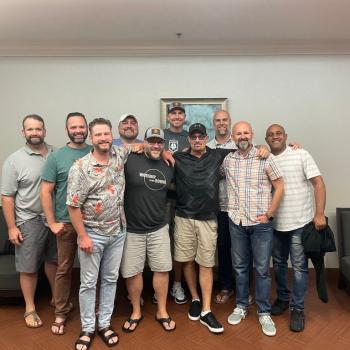Mike has come out with a new book. It’s called Bullying in the Church.
I caught up with Mike to discuss his new book.
Enjoy!

What provoked you to write this book?
It took a while, but I saw it with my own eyes. I guess the bullying behavior had always been there (with certain people and cliques), but it sprang to life when a good friend of mine came to church. The way she was welcomed and treated stunned me.
It was then that I noticed (and recalled) people being excluded and turned away from various ministries. I heard people gossiping and looking down on others. I experienced the sorrow others felt when they told me how they were slandered and how they felt that they weren’t being supported or cared for by “leaders” in the church. I was saddened, angry, and worn out emotionally from everything I heard and saw. It caused me to do some major reflection on living by grace toward people and how we the church must conduct ourselves.
How are you defining bullying?
I do not define bullying with the typical street definition. That is for sure. Everywhere we go, from comment threads on the web to CNN, people are watering down and misunderstanding bullying. People are not bullies simply because of a view they promote or because they think someone is mean.
According to one of the top researchers on the subject, Dr. Dan Olweus, bullying is “when someone repeatedly and on purpose says or does mean or hurtful things to another person who has a hard time defending himself or herself.” And when people have power (either in cliques at church, or in leadership) and jealousy or envy is brewing, bullying is not far.
Give some examples of how people bully others at church?
Bullying raises its ugly head in many forms, however in the church, as in other higher-level social institutions, if bullying is taking place it will usually be of the social-relational type. This includes the excluding or isolating of people, spreading gossip, lies and rumors, and manipulating friendships.
There are many stories of people who have had their reputations damaged and their social standings slashed in the church. In the second part of my book we look at three major relational sins that seek to devour the church: gossip, slander, and favoritism. These three I refer to as the three-headed monster of relational sins.
How should a person respond in a Christ-like way when they are being bullied?
Simply put, we need to be more like Christ. Our Lord was treated terribly, slandered, and betrayed and though technically he wasn’t bullied, since he could have easily defended himself, he showed restraint, love, and even grace to others. He was a perfect model for us. He taught us to love God and our neighbor.
Now part three of the book really fleshes out what it means to live by grace toward all people – even those who bully through gossip and slander.
However, when we are being ostracized and treated badly by those in the church, there comes a point when we must no longer turn a blind eye. Some type of intervention must be done or it will continue to take place and more people will have bad church experiences. Chapter 12 of my book speaks more on what to do when bullying occurs regardless of who it is. This is where we must follow the words of Christ regarding church discipline.
Why do people bully others in the first place?
The research suggests that there are some interconnected motives that people have for bullying. First, people who bully usually do so because they have a need to be in control. Next, those who bully actually find some satisfaction and fulfillment in hurting others. Finally, there is some reward that they receive for their behavior. We all know intuitively that this behavior is wrong and thankfully for those who love the Lord we can be sure that the Spirit of God will convict them.
Tell us a story of someone being bullied at church and what the response was that glorified Christ.
Sadly there are many instances of bullying in churches. We could probably think of many. I do recall one young lady who was slandered and cut off from ministries yet hung there and continued to persevere and do her best to love those around her. Slowly she won many over and demonstrated that her faith was genuine. It became apparent to many that those who treated her badly truly had some major issues going on in their lives. Some even made things right and reconciliation took place, while others just gave lip service. Regardless, this woman’s resilience was obvious and her love for God was apparent.
What has the response been from those who have read your book so far?
I am very blessed by the response I have been getting from those who have read the book. Every single person has identified and experienced this to some degree in the church. They have expressed hope and encouragement that more people will read this book and be provoked to live by grace.
This includes some of the great pastor-theologians of our day. To have Dr. Frame, Dr. Beeke, Dr. Jones, and R.C. Sproul Jr. endorse my book brought me great joy. And Dr. Robert Peterson, who wrote the foreword, helped me through the entire process. These godly men understand how important this book is for the church.
What other things would you like readers to know about your book?
I am confident that this book will stir the people of God up to love and good works. It is important to know that the relational sins that are involved in bullying—gossip, slander, and favoritism—will slowly fade away from the church as we actively live by grace in every relationship. This is the calling of every believer. You and I can eradicate these sins because of Christ in us. We are new creatures in Christ Jesus. We are in spiritual union with the Son of God.













